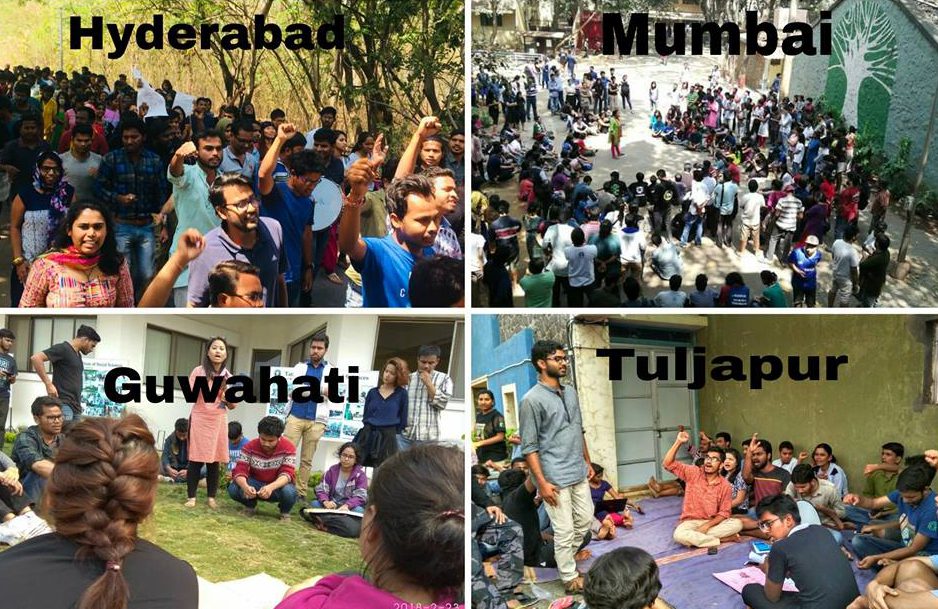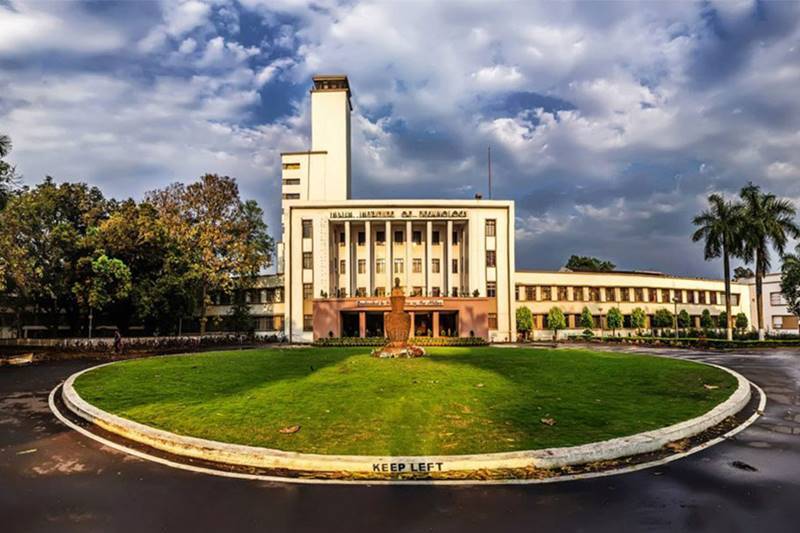Posted by Snehashish Das
Information about different campuses shared by Vinathi Gurijala, Shraddha NV Sharma and Sahil Verma
Experience shared by Moulika Chinduluri
There was a time, facilitated by constitutional rights when Bahujan students came into university spaces. Not just for representation, but to de-Brahmanise the discourse of merit. Many educational institutions using their autonomous powers, also with the help of state mechanisms, were facilitating it to a larger extent by promoting scholarships, fee waivers, financial aid, etc.
Equality, social justice, inclusivity were understood, to an extent, as the language of knowledge. 14 years earlier, Tata Institute For Social Sciences (TISS), along with the people practising the same ideology, brought about financial aid in the university.
But on February 21st, the ex-Director of TISS, Dr Parsuraman made a derogatory statement that TISS was doing a favour to Bahujan students since 14 years. Dr Parsuraman seems very keen on indulging having a sense of private ownership over resources, on which Bahujan students have no share or right.
His understanding of financial aid as charity and not a right is indicative of how the TISS administration is ready to escape from their responsibilities. Countering that, Prof. Parthasarathi Mondal, on February 27th, made a statement in a public lecture “I am going to demand of this institute that the unconditional love, the loyalty, that the students have shown to the institute be respected by them”.
The nexus between the Hindu state, market, the TISS administration and the administration of every single university, mostly public universities that teach social sciences, is betraying students. The privatization of education was started before the Structural Adjustment Program (SAP) in India, during Rajeev Gandhi’s term as Prime Minister.
With the SAP in the 1990s, the privatization and corporatization of education solidified in India which was demanded from global governance bodies. The nexus between the Hindu state led by RSS-BJP government and a neoliberal framework is keen on producing Manuvadi education and funding research on cow-nationalism and cow products.
Social sciences like Women’s Studies, Social Exclusion and Inclusive Policies, Human Rights are marked as threats to this nexus and its existence. They want to close them down by using state mechanisms like the UGC, MHRD fund cuts, scholarship cuts, seat cuts, fee hikes, etc.
The state in this neoliberal era has deliberately commodified education. Teachers across universities, as a part of this process, have to sell their potential labour and students are trained to develop their consumerist attitude in the educational market. The scope of the students in accumulating knowledge has been restricted; the teachers’ freedom to dissent has been curtailed.
State mechanisms and other official bodies are managing and guiding the market, trying to set up the language of knowledge. Their language of knowledge is not open to criticism. It is exclusionary and constructed under a Manuvadi framework.

Image credit: Snehashish Das
As Manuvad has become the safeguard of neoliberalism, education has become a profit-making organisation. The state and the corporates invest their private capital in order to accumulate maximum profit. But who is this nexus victimizing immediately? The Bahujan students.
After the introduction of Direct Benefit Transfers in the PostMatric Scholarship for the Government of India (GOI PMS) students, the TISS administration laid claims to suffer a huge loss in that process. Financial aid was withdrawn for OBC students in 2015.
In the following year, the TISS administration issued a circular to withdraw the financial aid provided to SC/ST students, even those eligible for the GOI PMS scholarship. While GOI PMS students enrolled in the university after seeing the Prospectus of 2016-17, 2017-18, where there was no mention of the withdrawal of financial aid, the TISS administration asked them to pay the dining hall (DH) fees and the hostel fees which costs 62,000 rupees per annum.
The administration also made students pay fees even after the completion of the course, with the original degree certificate kept in the institute until completion of payment. According to an RTI, the number of OBC students has fallen to 18% in 2016-17 from 27% in 2013. In the intervening years between 2013-14 to 2016-17, there has been a fee hike of 45% and is expected to increase in the upcoming academic years.
The sudden arbitrary decision of the TISS administration marks the exclusion of SC, ST and OBC students from the university, while TISS claims to be a ‘World Class’ university. S. Seigoulien Haokip, a 2nd-year student of the TISS Guwahati campus says, “Translating inclusion into seclusion is exclusion”.
The TISS Guwahati campus, which celebrated diversity since the inception of the campus, will end up producing students of uniform ideology and identity if this exclusionary plan is successfully implemented. The biggest asset of the Guwahati campus, which is known as the ‘North Eastern Regional campus’, i.e. comprising students from different tribes of the North-East – will be invisibilised from the campus.
Moulika, a GOI student of TISS Hyderabad, narrates her personal experiences:
As a GOI student, I came to TISS with much hope and enthusiasm that my family members and neighbours were equally overwhelmed. I joined TISS in 2013 to an integrated course (BA+MA) intake. Now in the final semester as a Masters student in Natural Resources and Governance, I am ready to enter the outside world to put my learnings into application.
In the last five years at TISS, I grew from an under-confident girl to a girl who speaks for her own rights and also for others. It trained me critically to look at the multilevel complex dynamics of how society functions, while leaving the marginalised behind. We were taught to work towards social inclusion and justice.
The skills and knowledge provided by TISS fetched me a job as a development coordinator. My immediate and extended family are really happy: for I am the first generation graduate among the females in our family. Classroom discussions in TISS emphasize education being a tool to uplift the vulnerable sections, yet it is evident now that the institute practices systematic exclusion by not letting students belonging to certain socio-economic sections to have access to higher education at TISS due to their financial stability to pay the high fees, contradicting itself.
Whenever I go for field work to rural and tribal areas, I always talk about TISS, motivating the youth there to join – especially girls. Their immediate question is always about the cost of education and other expenses, where I could confidently reply saying, “TISS IS FOR EVERYONE”, that government provides scholarships to the marginalised. I have always believed that TISS doesn’t discriminate, but NOW, I stand not knowing whether I’ll receive a degree or an empty envelope during convocation despite receiving a job because of my family’s inability to suddenly pay a huge amount.

Image Credit: Facebook
A movement against this arbitrary decision of the TISS administration, against the privatization of education and against the state-market nexus has cropped up in all four campuses of TISS from January 21st. Many political groups, academicians, activists and students from different universities from India and outside have come together in solidarity with us.
We are also trying to encapsulate the happenings in different TISS campuses.
TISS Mumbai campus
Following the complete boycott of classes on the 21st of February, the student body with the Student Union (SU) in the lead, blocked the main gate of the campus. The students continued the blockade throughout the night.
On the second day, the admin finally relented to a conversation with the students in the evening but insisted on a delegation to discuss the charter of demands. A delegation of 20 people including 4 members of the SU met the admin at their office.
The meeting ended in a walkout by the student delegation as the admin refused to sufficiently engage with the students’ concerns and difficulties. The admin even threatened to make the students pay the tuition fees upfront and not only the DH and hostel fees if the protests persisted.
The students decided to carry on the agitation. On the third day, while the admin continued to be silent, the TISS SC/ST Employee’s Welfare Association and the TISS Teachers’ Association (TISSTA) met the students at the main gate to extend their complete support and solidarity. They also condemned the recently retired Director’s derogatory remarks.
On the fifth day of the strike, the Academic Council of TISS Mumbai met the general student body to address demands. The admin gave only assurances of partial fee waivers, extension in terms of the payment to the current batches while nearly all the demands in the Charter of Demands stood unmet. The student body continues to protest until all concerns are addressed.
Also Read: NALSAR University Of Law: Sexism & Casteism Behind A Liberal Facade
On the announcement of the hunger strike by students of TISS Hyderabad on the seventh day of the strike, the protesting students created a blockade around the administration building, forcing the Registrar and Acting Director to leave for the Hyderabad campus immediately. With none of the demands fully addressed, the protest and blockade continue.
TISS Guwahati campus
Cuts in financial aid for the GoI-PMS students is the immediate concern raised in the agitation, but at the same time students have also raised concerns about the deliberate fee hike which would be imposed from the approaching semester, suspension of non-NET scholarship, delay in payment to teachers and other staff members and the contractual nature of their employment, absence of a teachers’ association across campuses and a highly centralised financial and administrative power in the TISS head-office, as a result of which all so called ‘off campuses’ have to depend upon Mumbai for everything.

Image credit: Facebook
On the very first day, students of the TISS Guwahati campus called up the professors to join the struggle as it’s a joint issue for both. Some professors along with the admin staff came in ‘solidarity in spirit’ and agreed to guide the students in their collective cause.
The students held a 24-hour strike in the campus the second day. 23 faculty and administration staff members signed a joint letter of concern and forwarded it to the administration in the Mumbai campus to take immediate actions.
The following morning, the students’ collective had a blockade and did not let the staff enter the premises due to the unresponsiveness of the TISS administration to the growing nation-wide agitation. The blockade was called off by evening as a few faculty members visited the student body and educated them on how to make the strike and movement more sustainable.
On Saturday, 24th February, student activists from the Satra Mukti Sangram Samiti and Student Federation of India, Banojit Hussain, a student activist from Delhi, Ankur Tamuli Phukan from Uki Research Network and former student unionist and Mayur Chetia, a columnist, came to campus to meet the students. A citizen’s meet on the impact of and problems of privatization of education was planned for Wednesday, 28th of February.
The TISS Guwahati administration circulated an official notice to resume classes from the 26th, but students kept on boycotting classes, despite having dissertations, assignments, etc. pending, as a means of protest.
On 28th February, the students of TISS Guwahati off-campus and the Students’ Council with the Joint Action Committee formed for the purpose of the strike have organized a Citizen’s Meet at the Guwahati Press Club from 3 PM.
Students have invited many social activists, political activists, academicians, along with TISS administration members to join the citizens’ meet and be answerable to the larger public. Student bodies across the university in all four campuses have garnered solidarity and support from a diverse range of institutions and political groups across North-Eastern region as well as from the rest of India.
TISS Hyderabad Campus
TISS Hyderabad has started its struggle against this undemocratic act of the administration, by marching to the Ambedkar statue near campus. In addition to the scholarship concern, the Hyderabad campus has specific concerns related to the appalling conditions of the hostels, the exorbitant expenses charged for them, the lack of security in the campus and hostels and health concerns due to substandard facilities.
Following the day after the march, students protested by blocking the administrative staff and faculty from the entering the campus building. Following this, a Student Action Committee (SAC) was formulated, which was assigned the duty of being the official student representation to the administration.
A meeting involving the Deputy Director (DD) of TISS Hyderabad, a few faculty members and the SAC was convened to discuss the concerns of the students. As the outcome of this meeting, the DD had promised to address each of the concerns in the next 24 hours from the meeting.

Image credit: Facebook
The issues were then discussed by the management committee the next day and an email was sent to the students in response to the concerns. The students were utterly disappointed with the response. They called for a General Body meeting the following day to discuss the email in detail.
Following which, the DD was asked to meet the students. The DD complied and interacted with the students. The DD then conveyed that the cut down of scholarships was due to the ‘misinterpretation’ by the administration regarding the definition of creamy layer and many other factors.
A letter was signed by the DD and the Social Protection Officer taking full responsibility for this ‘misinterpretation’. The same letter was to be presented to the registrar on the next day (24th Feb). The letter, however, was not even recognized by the registrar.
This led to utmost dissatisfaction and anger among the students of Hyderabad. As a response, the students have decided to organise an indefinite hunger strike until the concerns are addressed. This was launched on the 27th. More than 26 students have volunteered to sit for the hunger strike, demanding the registrar to directly address the students of the Hyderabad campus and their issues.
Responding to this, the Acting Director of TISS has come to Hyderabad and has given a written statement discussing the concerns of the students. The same is under deliberation. As of now, the students remain dissatisfied with the response to the demands and are continuing the protest.
The faculties of TISS Hyderabad, many organizations and individuals across India have expressed complete solidarity with the struggle.
TISS Tuljapur Campus
The TISS Tuljapur campus is also standing in solidarity with the main campus in this fight for the right to education. Adding to the demands from the other 3 campuses, students at TISS Tuljapur have kept their own demands in front of the administration and government on proper accommodation and infrastructural development, maintenance of electrical appliances and water facilities in the whole campus including faculty quarters and regular reports to be made.
In addition, full inclusion of student council members to administrative and other academic functionaries and they will be included in the decision-making process along with the administrative staff. They are also demanding for the partial/full autonomy of TISS Tuljapur from the Mumbai campus.
There is also a huge problem with the ratio of student-teachers in classrooms and the quality of education which is being degraded every day in the Tuljapur campus. From the 26th till today, students of TISS Tuljapur blocked the administrative building, closed the library, computer centre and boycotted classes, presentations and exams.
On the 27th, a public meeting was held in front of the admin with all students in campus present. Students proposed their demands but the deputy director denied all the demands and issues of students. He ended the meeting by saying that all issues are related to the UGC and the Mumbai campus administration.
The protest will last for an indefinite period till all problems are addressed and resolved in favour of the students. Students are also sending emails to MHRD, UGC and PMO to intervene in this issue. Now TISS Tuljapur demands that Acting Director and Registrar should come to the Tuljapur campus to address students.
We request all the students, activists, academicians and every single responsible citizen of the country, and beyond, to come in solidarity with us.
I’ll end with a statement: If you think resistance is expensive, then wait and see what this state-market nexus costs you further.
Also Read: Dear Bahujan Students, You Are Not Alone In This Agrahara
Snehashish is a Bachelors final year student of TISS Guwahati, studying the Social Sciences interdisciplinary course. Vinathi is a second-year student of the B.A. programme at TISS Hyderabad. Shraddha is a 2nd-year student of Women’s Studies, TISS Mumbai. Sahil Verma is studying MASW in Rural Development II from TISS Tuljapur. Moulika is a student of the Natural Resources and Governance programme at TISS Hyderabad.
Featured Image Credit: ‘TISS for Everyone’ Facebook Page
About the author(s)
Guest Writers are writers who occasionally write on FII.




